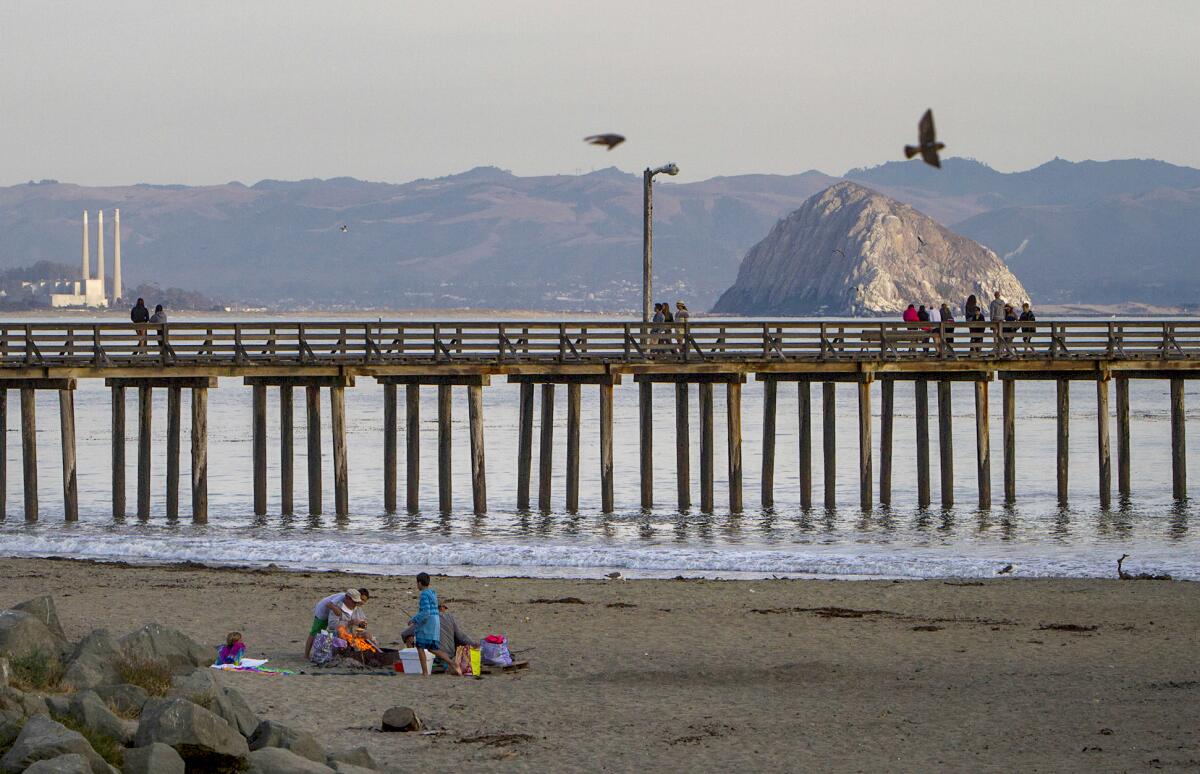The makings of a Central Coast ghost town

Good morning. Here’s what we’re covering today.
- Cayucos residents are being priced out by Airbnbs that sit empty for parts of the year.
- Gov. Gavin Newsom signed and vetoed several bills.
- These six pumpkin spice recipes will help you embrace fall’s favorite flavor.
- And here’s today’s e-newspaper.
Sign up for Essential California
The most important California stories and recommendations in your inbox every morning.
You may occasionally receive promotional content from the Los Angeles Times.
The makings of a seasonal ghost town
It’s a classic California story.
A town with a certain charm, right on the beach, which for decades had been home to hippies and surfers is now an unaffordable nightmare: The cheapest house on the market costs more than $1 million, and permanent residents have been pushed out in favor of Airbnbs that sit empty for long stretches of time.
Welcome to Cayucos, where all the elements that make for California’s contentious housing wars have converged.
L.A. Times reporter Jack Flemming recently reported on the city that once called itself “California’s last remaining beach town” — and is now more of a ghost town.
To understand what happened in Cayucos, it helps to take a look at the towns nearby.
Cayucos has seen particularly effective efforts to block development.
The Cayucos Land Conservancy formed in the 1990s to stop a resort development by convincing the California Coastal Commission to disallow the project. That site has since turned into a state park.
In the wake of the years-long battle, Cayucans branded themselves “the little town that could,” Flemming reported.
Unlike Northern and Southern California, the Central Coast has vast stretches of open land that could be developed. But in the decades since its formation, the conservancy has acquired hundreds of plots of land in attempts to create a pristine, undevelopable greenbelt surrounding Cayucos.
“We were lucky to be behind the curve,” Greg Bettencourt, who serves on the conservancy board, told Flemming. “We saw the development that was happening up and down the coast in Ventura, Oxnard, Santa Cruz, Monterey. We saw our future and decided we didn’t like it.”
Prices in beach towns up and down the coast have risen. They’ve risen more in Cayucos.
Here’s what Flemming found:
“Cayucos home prices have mirrored most of California, doubling over the last decade or so with a significant spike during the pandemic. But the low supply has sent prices soaring to greater heights than for its Central Coast neighbors.
“The median home price in Cayucos is $1.314 million, according to Zillow. That’s higher than Los Osos ($856,586), Morro Bay ($941,326) and Cambria ($1.006 million).”
There’s much more to the story than that. Read more about how locals are grappling with their changing town.
Today’s top stories
Gov. Gavin Newsom signed and vetoed several bills
- Wary of stifling innovation, Newsom hesitated on major tech bills.
- He also vetoed a bill aimed at providing more protections for farmworkers overcome by extreme heat.
- The governor signed into law a bill that increases criminal penalties for those who harass or threaten patients entering abortion clinics.
- Newsom also signed several anti-crime bills.
- IVF will be covered by insurance for many Californians after Newsom signed this bill.
- And a new law allows late-night drinking for Clippers VIPs at Intuit Dome.
Local fire chiefs say Forest Service staff shortages have exacerbated wildfires
- The Airport fire was the latest example of how Forest Service staffing shortages have hindered firefighting efforts, putting public safety at risk, according to Southern California fire chiefs.
- These hiking trails are closed due to wildfires in Southern California.
- Track wildfires across California and the West using the L.A. Times’ wildfire tracker.
What else is going on
- Francis Ford Coppola’s $120-million “Megalopolis” bombed at the box office.
- Here are four takeaways from the extremely early first debate in the 2026 California governor’s race.
- Kris Kristofferson, the singer-songwriter who changed country music, has died at 88.
- Fall baking! Temperatures in Southern California are set to soar above normal. How high will they go?
- Shohei Ohtani fell short of a triple crown but extended his hitting streak in the Dodgers finale.
Get unlimited access to the Los Angeles Times. Subscribe here.
Commentary and opinions
- In nearly 50 years, not a single vice presidential debate has made a difference in the race for the White House. But the matchups have still provided some of the most memorable political moments, Mark Z. Barabak writes.
- Harris’ economic plan is a grab bag of targeted subsidies. Trump’s is nonsense on stilts, Doyle McManus writes.
- Editorial board endorsement: Yes on Proposition 3. Remove same-sex bigotry from the California Constitution.
Today’s great reads
What a 1,000-mile railway across the Yucatán jungle says about Mexico’s outgoing president. The $30-billion train line has come to symbolize the presidency of Andrés Manuel López Obrador, an ambitious, often divisive leader obsessed with cementing his legacy.
Other great reads
- Marilyn Manson returns to tour after multiple rape allegations. Activists are furious.
- The internet helped make JJ Redick the next Lakers coach. Now he’s unplugging.
How can we make this newsletter more useful? Send comments to [email protected].
For your downtime
Going out
- 👻 Here are 31 things to do in L.A. that will spook, thrill and frightfully delight you in October.
- 🎦 “Megalopolis” hit theaters. Our review from when it premiered at Cannes called it “juicy” and “weird.”
- 🎭 The L.A. Opera gave “Madame Butterfly” a classic Hollywood angle, for better and worse, our reviewer wrote.
Staying in
- 🎃 Pumpkin spice is everywhere — these six recipes embrace fall’s favorite flavor.
- 📺 Season 50 of “SNL” started with Maya Rudolph and special guests in the cold open.
- 📡 DirecTV will acquire Dish Network and Sling TV for $1.
- 🥗 Here’s a recipe for turmeric-roasted squash with caramelized dates and spicy nuts.
- ✏️ Get our free daily crossword puzzle, sudoku, word search and arcade games.
And finally ... a great photo
Show us your favorite place in California! Send us photos you have taken of spots in California that are special — natural or human-made — and tell us why they’re important to you.

Today’s photo is from Times photographer Brian van der Brug, of Venice Beach. A deep marine layer enveloped the Los Angeles region last week, bringing June gloom to September.
Have a great day, from the Essential California team
Karim Doumar, head of newsletters
Amy Hubbard, deputy editor, Fast Break
Check our top stories, topics and the latest articles on latimes.com.
Sign up for Essential California
The most important California stories and recommendations in your inbox every morning.
You may occasionally receive promotional content from the Los Angeles Times.








